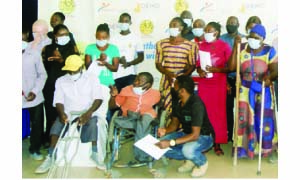By GIVEN BANDA
Inclusive participation in politics is key in every society. It is a cornerstone of democracy.
Article 29 of the United Nations (UN) Convention on the Rights of
Persons with Disabilities (UNCRPD) outlines the rights of persons with disabilities to participate in political and public life without discrimination and on an equal basis with others.
It also calls upon state parties to guarantee those rights.
The convention on the rights of persons with disabilities broadens the significance of persons with disabilities to go further than political rights, but also ensure that they can add their own voices to matters that affect them.
This is key if exclusion and inequality are to be eliminated in totality and if the interpretation of the phrase “leaving no-one behind” is to be put into context.
However, certain interventions are needed to see to it that persons with disabilities are the champions of their social, economic, civil, cultural and political rights.
Disability Rights Watch (DRW) and the Zambia National Women’s Lobby (ZNWL), with the support of Demo Finland, through the Political Participation Project, have taken a step towards ensuring that persons with disabilities are empowered with knowledge and understanding on how they can take part in the political and public life.
Recently, the two institutions carried out a programmed aimed at providing capacity building and political participation training in Lusaka and Mansa in Luapula Province.
The training was conducted in groups of two with less than 20 participants in each group.
This was in strict adherence to COVID-19 guidelines.
In Lusaka, the training was conducted at Cresta Golf View Hotel while in Mansa, it was at Mansa hotel.
The training initiative was centered on public speaking, media relations, communication, resource mobilization and networking as well as collaboration skills for persons with disabilities who expressed political interest.
Speaking at the opening of the workshop in Lusaka, DRW Director Wamundila Waliuya emphasized the need for persons with disabilities to avail themselves for leadership positions if they are to make inroads into decision making positions.
“Do not wait to be nominated, appointed or to be picked from hiding. This is the time to sell yourselves as persons with disabilities and compete on the political platform,” he said.
Mr Waliuya said the cry by persons with disabilities to take part in politics is not only for top leadership positions but other positions as well because that will be a be a good starting point for them to begin their political journey and become acquainted with how the political arena operates.
“When talking about political and public life, we are not only referring to positions such as counsellorship, Members of Parliament or the Presidency. But we are talking about being included in other political party positions such as the national executive committee, political party structures in the communities as well as district and provincial levels,” he said.
Mr Waliuya said even being included in campaign and mobilisation committees of a political party makes a difference in terms of the desired inspiration for persons with disabilities to participate in politics.
He said limited participation by persons with disabilities and women in decision making is as a result of violence in the political space.
He stressed that as the country heads towards the August 12 elections, peace should prevail during and after the elections if more persons with disabilities are to participate in politics freely.
Zambia National Women’s Lobby executive director Juliet Chibuta said vulnerable groups such as persons with disabilities, women and youths continue to face challenges in society and are the most underrepresented in Parliament.
Ms Chibuta said workshops held to train such groups will serve as a great step towards stimulating the participation of women and persons with disabilities in politics.
“Persons with disabilities are the best people to talk about issues that affect them and so it is important that they are given a seat at the decision making table,” she said.
Ms Chibuta said interventions, such as building the capacity of persons with disabilities through the training, will help them and the women to find themselves in key leadership positions.
She said this will increase the numbers of their representation in Parliament. Thomas Mtonga, one of the workshop participants in Lusaka who is also an aspiring MP for Chasefu Constituency in Eastern Province, commended the hosting of the training workshop.
He said it would contribute to his political ambitions as a visually impaired person.
“In all the 156 constituencies, I am the only blind person who has been brave enough to stand as MP. This training couldn’t have come at a better time than now and I am confident that more persons with disabilities will rise to the occasion and aspire to take up the various leadership positions,” he said.
Exhildah Chapa, a visually impaired participant who attended the workshop in Mansa, said the training had motivated her to avail herself in the political space because she now realizes her capabilities due to the skills and knowledge she had acquired from the training.
Ms Chapa said before the workshop, she had no vision of being in politics.
She said the workshop had taught her a lot and she had become so ambitious.
“I now realise that as persons with disabilities, we are capable and have the right to take part in politics and represent ourselves, she said
Indeed, with such interventions, a shift is expected to be seen in the political arena with more persons with disabilities rising to the occasion and availing themselves for leadership positions.







